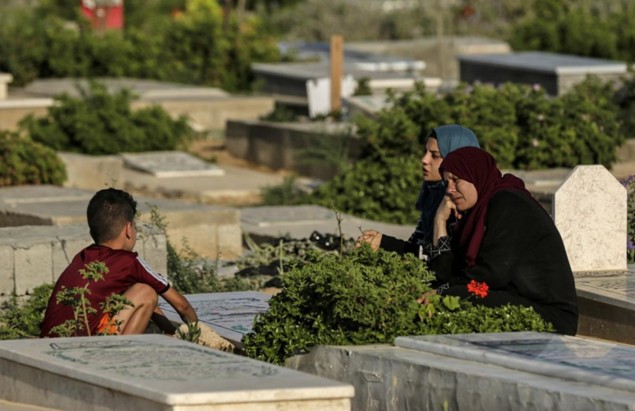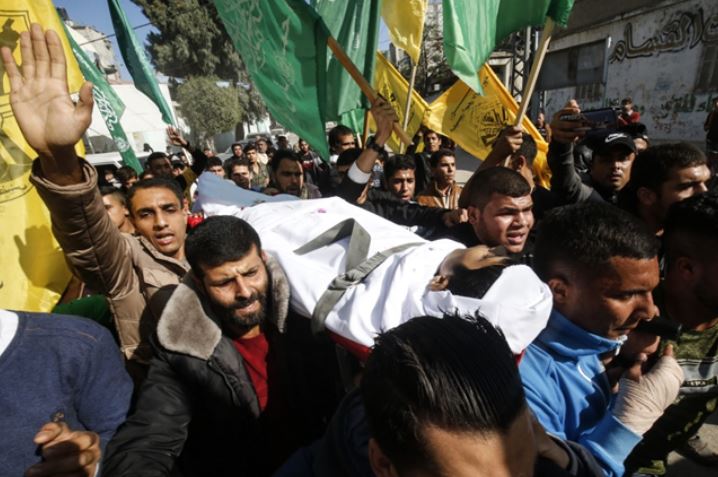How Israel controls Palestinian bodies, both living and dead

Israeli policies have transformed human bodies into bargaining chips, and mourning into a political act that is easily criminalised
My uncle recently passed, and after his wife and children washed his body, gave him a final embrace, and put him in his final resting spot, they shared their grief with friends, family and acquaintances.
Only then were they able to begin mourning his loss. This sacred process of mourning allows communities and loved ones to begin moving forward - to move on, and to provide a final act of giving to the deceased. Only then can they begin accepting condolences.
At the funeral, I watched the pale, grieving faces and thought: “At least he died of natural causes. At least we got to bury him and shower him with love.”
Cemeteries of numbers
I say that with the recognition that most Palestinian families know of one martyr within their extended circles. Worse off are the families of Palestinian martyrs whose bodies are still being held by Israel.
Since 1967, hundreds of Palestinian bodies have been held by Israel: some in freezers, and others believed to be in the notorious “cemeteries of numbers”. Families of the martyrs have been trying to bring them back home.
Yet, the first demand of Palestinians is not for Israel to return our bodies; it is to stop killing us in the first place. Stop taking land, displacing families, incarcerating entire generations, and enabling a foreign population to take over what little remains of Palestinian cities, only to punish anyone who says “enough”.
Loss, in the frame of the Palestinian struggle, is a relentless reality in the Palestinian experience. It comes mired in political realities and psychosocial dominance. Loss becomes a fight against a powerful regime for the simple act of burial - to give prayers for peace and mercy over a body that was once so full of life, only to return to the phantoms they leave in the home - and that is no simple task.
During a news conference in 2016, one mother spoke to me, uttering in laboured breath: “Please write something. We want to bury our children. We want to bury our children.”
I listened to her pleas, and thought about how many families must endure loss first in the fact that their loved one is killed by Israel; then, in recognising the reality that there will not likely be any accountability; then, in the misconstrued reports and representations by mainstream media; and finally, in having to negotiate with the power that killed their loved one over the release of the corpse.
Glorifying martyrdom
Although martyrdom is often singularly showcased as part of the Palestinian experience, it is an intricate and important narrative of most nations trying to glorify the death of their people in the name of ideology. Even Israel participates in martyrdom glorification, but more often that is coated in the prevalent jingoism and the remembrance of its soldiers.
Our martyrs are valuable to us not just because of the struggle they represent, but also because they are people we have played with, fought, loved or disliked. Palestinian martyrdom takes on another dimension through how it is illustrated in the media, hindering our ability to bring a shred of dignity to those killed and those trying to move forward.
Not only are Palestinians denied the ability to die in peace; they are also stripped of the right to acknowledge that their death was caused by an unremitting occupying power.

Mourners carry the body of a Palestinian teenager killed in Gaza on 30 November (AFP)
When Palestinians are killed by Israeli forces, they are referred to in the passive form. The Palestinian “dies” rather than being “killed”. The Palestinian rarely has a name to showcase the travesty of this loss of life to the power of an army and a regime that is violently forcing itself into the Palestinian space.
This helps Israel not only to systemically colonise, displace, and mass incarcerate Palestinians with impunity, but also to colonise the space between Palestinians themselves. Even in mourning, there looms a scent of oppression and degradation.
Israeli forces even sometimes raid funeral processions of martyrs. By doing so, Israel transforms human bodies into bargaining chips and mourning into a political act that is easily criminalised.
Collective punishment
It is no wonder that in 2018, the Knesset passed a law that judicially affirmed Israel’s ability to withhold Palestinian bodies until preconditions are accepted for funeral arrangements.
Bodies are kept from bereaved families and utilised for political gain by various parties, despite this being a violation of international humanitarian law. It is a testament to Israel’s effort to control Palestinian bodies and further objectify them, in line with Israel’s common practice of collective punishment.
Gaza is enduring a slow death because of the punitive measures against the entire strip. A man in Rafah once told me: “We are being prepped to be sent to burial.”
But Gaza and the withholding of bodies are not the exception. From the increased surveillance of Palestinians through CCTV cameras stationed across towns and cities, to checkpoints, to incessant home demolitions, Israel is also socially engineering our emotions.
We cannot mourn, move or breathe without considering what Israel’s powerful army may do to us. Israel’s army is among the top 20 most powerful in the world, with a defence budget exceeding $19bn.
The fact that Israel maintains its right to withhold Palestinian bodies “regardless of their political affiliations” shows that the efforts behind this are not simply tied to Israel’s constant explanations of “security” and “defence”.
This is a statement that Israel is in control of not only the land, but the people - and that includes denying the right to mourn those taken from us.
Source: Mariam Barghouti, Middle East Eye

WRITE YOUR COMMENT